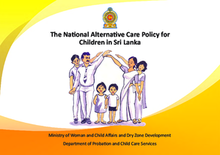Sri Lanka's National Policy on the Alternative Care of Children outlines a comprehensive range of alternative care options and encourages the reforming of all formal structures that provide at-home and out-of-home services for children deprived of care and protection or at risk of being so. This policy also extends to children under care of the Juvenile Justice System. It provides policy solutions to programming for children at risk of family separation and facing deprivations such as child abuse, neglect, child labor, poverty, addiction, imprisonment, human trafficking, mental and physical disabilities, HIV/AIDS, domestic violence, orphanhood, abandonment and displacement etc. The policy also takes into consideration and encompasses provisions to children who are forced to live and work on streets.
In this document, alternative care is defined as any care provided to a child away from his or her parental home and is further classified as "family-based care" with kin, foster or adoptive parents and "family-like care" in residential settings that resemble family environments such as and not limited to safe houses, emergency shelters, respite care, group homes, and volunteer homes. Although Sri Lanka has some family-like care options, most residential settings need restructuring to create suitable family-oriented conditions as at times, a child may have to be placed there temporarily when necessary, appropriate, and conducive to his or her well being. Bearing this in mind, the policy supports a systematic deinstitutionalization through the implementation of stringent time caps on the duration of stay and restructuring existing residential facilities by downsizing and creating more child friendly places while awaiting reunification or transfer to family-based care. This policy consists of the following six general policy statements and a comprehensive range of policy provisions for each:
- Prevention
- Gatekeeping
- Children in alternative care systems
- Children in contact or conflict with the law
- Reunification and Reintegration
- Legal reforms, policy guidelines and minimum standards
Considering the economic, social and cultural conditions of Sri Lanka, this policy aims to guide the work of the Government, its service provider agencies, developmental partners, private service providers and all other stakeholders to implement their obligations towards children deprived of or at risk of losing family environment.

